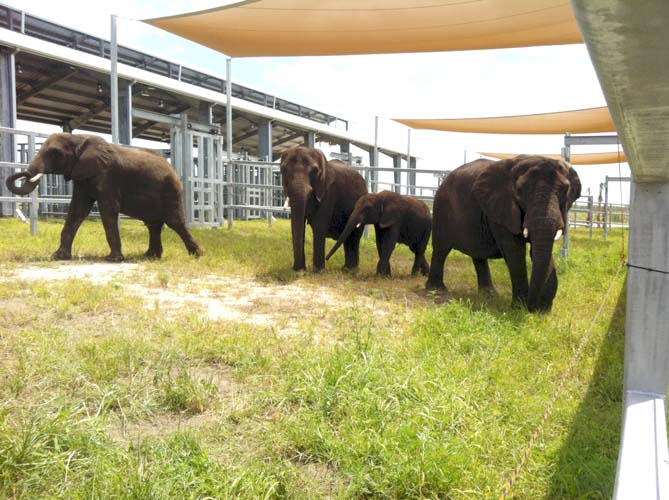FELLSMERE — The first elephants have moved into The National Elephant Center in Fellsmere and are getting acclimated to their new surroundings. The four African elephants are a family group consisting of two males and two females, relocated from an accredited zoo in central Florida.
“We’re thrilled to welcome the first elephants to The National Elephant Center,” said Keith Winsten, The Center’s board chair and executive director of the Brevard Zoo. “We’ll provide these animals and those that arrive in the future with the highest quality of animal care, inspired by our deep love of elephants.”
It was not immediately known for how long the elephants will be staying at the Fellsmere facility.
As many as five more elephants could join the herd as the barn has capacity for nine animals, though no additional elephants are confirmed.
The Center could some day care for dozens of elephants as additional barns and habitats are completed on the 225-acre site. The first phase of development saw the completion of a large barn with paddocks, a keeper work center and four interconnected pastures that provide the elephants more than 20 acres to roam.
Each pasture includes watering holes, mud wallows, dust bathing areas, shade and other natural features used by elephants.
The facility has been designed to accommodate both African and Asian elephants separately so as to avoid the potential for diseases spreading between the two.
African elephants are larger than their Asian counterparts with the capability to grow more than 13-feet tall and weigh more than 10 tons, or 20,000 pounds. They also have the largest brain and longest gestation period of any land animal with each pregnancy averaging more than 21 months.
The Association of Zoos and Aquariums’ Elephant Species Survival Program (supported the animals’ move to The National Elephant Center. Because elephants are endangered, the program carefully manages the population in accredited North American zoos to ensure individuals are part of healthy social groupings to ensure their health and well-being.
Though not open to the public, The facility plans to develop opportunities for local school children to visit and learn about elephants, which are critically endangered. Limited opportunities for donors and members of the public to visit at select times are also in development.
“We’re extremely proud of The National Elephant Center and the care we provide,” said Executive Director John Lehnhardt. “We want to share our love of elephants with the community and help foster greater appreciation for these incredible animals. We encourage everyone to follow updates on our blog at NationalElephantCenter.org and stay updated to learn more about how you can support elephant care.”
For a limited time, all donations will be matched by a private foundation so cash gifts will go twice as far. The Center also created a materials wish list of everyday items that will help provide care for elephants. Community members can visit NationalElephantCenter.org to review the wish list and make a donation.

